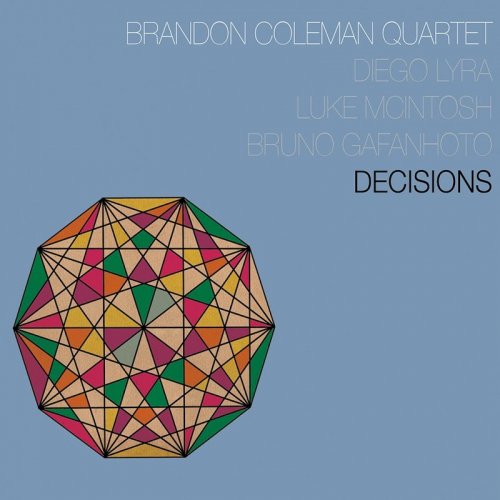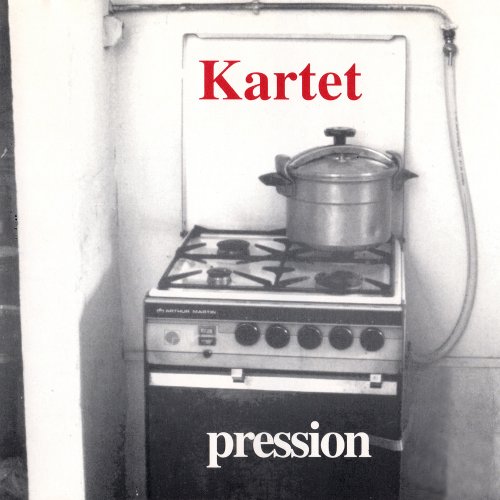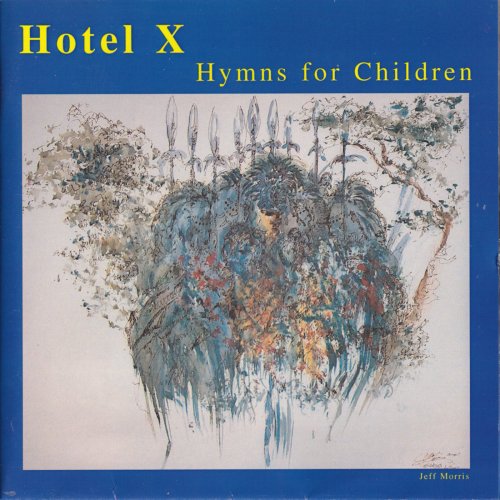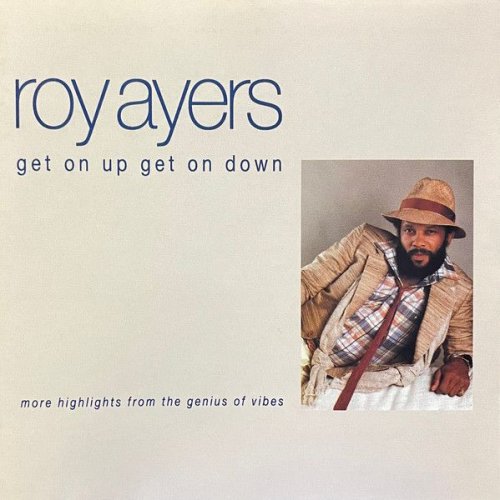Brandon Coleman Quartet - Decisions (2013)

Artist: Brandon Coleman Quartet
Title: Decisions
Year Of Release: 2013
Label: Brandon Coleman Quartet
Genre: Jazz
Quality: Mp3 / 320kbps
Total Time: 53:04
Total Size: 114 MB
WebSite: Album Preview
TracklistTitle: Decisions
Year Of Release: 2013
Label: Brandon Coleman Quartet
Genre: Jazz
Quality: Mp3 / 320kbps
Total Time: 53:04
Total Size: 114 MB
WebSite: Album Preview
------------
01. Rewind 09:08
02. New Blues 07:46
03. Vast 07:32
04. Deimos/Phobos 11:18
05. Geometry 06:51
06. Decisions 10:29
Once I finished listening to the Brandon Coleman Quartet’s latest release, I decided that a good amount of reflective analysis would be necessary to fully digest the album. After a handful of repeated listenings, I came to the conclusion that the most striking aspect about the record is its title, Decisions. And yet in order for decisions to be made, questions must first be posed, and one can only imagine the breadth and scope of questions that invariably ran through Coleman’s head during the album’s formative stages, questions like: Which players should be on the record? What is the guiding compositional directive? How extensive should each track’s solo section be? And, of course, one of the most important decisions: how to strike a perfect balance between originality and honoring one’s influences.
Coleman has apparently made all the right decisions with this new record. By assembling a crack team of international musicians, he has revealed an admirable appreciation for various musical traditions and a sibylline awareness of the myriad ways in which they contribute to and enhance his unique compositions. Bassist and Australian native Luke McIntosh is the foundation upon which Decisions is built; his impeccable tone and unshakeable sense of time provide the perfect foil for drummer Bruno Souza, one of two Brazilian natives on the record. Since their similar approaches to harmony blend perfectly and never contrast, I’d swear that piano/keys player Diego Lyra and Coleman are harmonic blood brothers. Simply put, one could not ask for a better cast of young, talented musicians.
The album’s first track, “Rewind,” kicks things off with a lone bass groove that yields artfully to the catchy, glimmering melody. As Lyra’s piano solo threatens to boil over, a guitar solo begins and picks up right where Lyra left off. When Souza pronouncedly places more emphasis on the backbeat, the energy rises to the point it sends electric shivers down your spine. Coleman’s tone is clean and big and reminds me of ‘70s-era George Benson mixed beautifully with the more contemporary Jonathan Kreisberg. One could easily interpret the song, with its bright, hummable melody and danceable groove as Coleman giving a nod to—a “rewind,” if you will—a formative period in modern jazz’s development, with his keen eye fixed equally on the future.
“New Blues” features a lovely solo guitar intro that flows into an enchanting and flowing melody. Subdued but thoughtful accompaniment by the other players support the melodic structure and lightly over-driven guitar solo. Fans of contemporary axe masters like Gilad Hekselman, whose influence beautifully haunts “New Blues,” will find much to love on the album as a whole and this track in particular. The interplay between Souza and Lyra during Coleman’s solo is telepathic and rewards repeated, careful listenings.
As one wonders if the energy on “New Blues” will ever fade, the track abruptly ends, giving way to a lone piano ostinato that begins the third track, “Vast.” Lyra punctuates the repeating figure with a set of ominous block chords that act brilliantly as a tonal chiaroscuro between “New Blues” and “Vast.” Souza is given ample room to stretch out his chops over the ostinato while he lays down a fine drum solo. But after Souza has said all that needs to be said, the tone shifts, and a sparse, desolate melody by Coleman rings out. The energy dramatically builds and builds, and then, in a moment of heavenly revelation, the mood shifts as a guitar solo begins over top of Lyra’s twinkling, epiphanic chordal pronunciations. The cinematic tone of the composition lends itself to comparisons with recent records by younger musicians like Aaron Parks and Christian Scott, who share with Coleman an understanding of tone and mood that too many contemporary musicians have recently eschewed in favor of complexity and angularity.
The Greek titled “Deimos and Phobos” is the album’s only true ballad, and it’s an exemplary study in understatement. Coleman’s light and haunting melody opens up space for McIntosh to harmonically embellish the chord structure and provide movement. After Coleman’s guitar spotlight, Lyra takes a beautiful, simmering piano solo that gives way to the track’s slow, graceful end.
The album’s big cooker, “Geometry,” begins with strong, open chords that kick off the song and immediately set the vibe. Coleman’s breezy, ethereal melody rings out over top of Souza’s brilliant support. Souza’s accentual use of various cymbals provides a sense of movement that counterbalances the light, airy melody. A rhythmically knotty section pops up before things open up for solos. McIntosh takes the first one and is followed by Lyra. Coleman’s accompaniment underneath the piano solo is worth paying close attention to for the masterful way in which he superbly blends a rock sensibility with the delicateness of jazz.
By placing the title track at the album’s very end, and keeping the record’s title in mind, Coleman provides his listeners with a tool for reflection. Since decisions are made at the beginning of an event or action, what does it mean to place “Decisions” at the end? Is it just a tongue-in-cheek move, a play on the order of traditional sequencing? Or is it a somber, reflective look back at the preceding five compositions? The way the track unfolds, slowly and mysteriously, into a delightful melody that’s soon followed by a series of stellar solos by Lyra and Coleman, can be interpreted as the perfect synecdoche for the album. Intelligent and yet never too complex melodies define Decisions, while individual solos stand out as treats within the broader compositions. One gets the feel that Decisions was a truly democratic effort, with input from all members valued equally. And when it comes to making music, that’s perhaps the most important decision of them all. -michael f. miller
Coleman has apparently made all the right decisions with this new record. By assembling a crack team of international musicians, he has revealed an admirable appreciation for various musical traditions and a sibylline awareness of the myriad ways in which they contribute to and enhance his unique compositions. Bassist and Australian native Luke McIntosh is the foundation upon which Decisions is built; his impeccable tone and unshakeable sense of time provide the perfect foil for drummer Bruno Souza, one of two Brazilian natives on the record. Since their similar approaches to harmony blend perfectly and never contrast, I’d swear that piano/keys player Diego Lyra and Coleman are harmonic blood brothers. Simply put, one could not ask for a better cast of young, talented musicians.
The album’s first track, “Rewind,” kicks things off with a lone bass groove that yields artfully to the catchy, glimmering melody. As Lyra’s piano solo threatens to boil over, a guitar solo begins and picks up right where Lyra left off. When Souza pronouncedly places more emphasis on the backbeat, the energy rises to the point it sends electric shivers down your spine. Coleman’s tone is clean and big and reminds me of ‘70s-era George Benson mixed beautifully with the more contemporary Jonathan Kreisberg. One could easily interpret the song, with its bright, hummable melody and danceable groove as Coleman giving a nod to—a “rewind,” if you will—a formative period in modern jazz’s development, with his keen eye fixed equally on the future.
“New Blues” features a lovely solo guitar intro that flows into an enchanting and flowing melody. Subdued but thoughtful accompaniment by the other players support the melodic structure and lightly over-driven guitar solo. Fans of contemporary axe masters like Gilad Hekselman, whose influence beautifully haunts “New Blues,” will find much to love on the album as a whole and this track in particular. The interplay between Souza and Lyra during Coleman’s solo is telepathic and rewards repeated, careful listenings.
As one wonders if the energy on “New Blues” will ever fade, the track abruptly ends, giving way to a lone piano ostinato that begins the third track, “Vast.” Lyra punctuates the repeating figure with a set of ominous block chords that act brilliantly as a tonal chiaroscuro between “New Blues” and “Vast.” Souza is given ample room to stretch out his chops over the ostinato while he lays down a fine drum solo. But after Souza has said all that needs to be said, the tone shifts, and a sparse, desolate melody by Coleman rings out. The energy dramatically builds and builds, and then, in a moment of heavenly revelation, the mood shifts as a guitar solo begins over top of Lyra’s twinkling, epiphanic chordal pronunciations. The cinematic tone of the composition lends itself to comparisons with recent records by younger musicians like Aaron Parks and Christian Scott, who share with Coleman an understanding of tone and mood that too many contemporary musicians have recently eschewed in favor of complexity and angularity.
The Greek titled “Deimos and Phobos” is the album’s only true ballad, and it’s an exemplary study in understatement. Coleman’s light and haunting melody opens up space for McIntosh to harmonically embellish the chord structure and provide movement. After Coleman’s guitar spotlight, Lyra takes a beautiful, simmering piano solo that gives way to the track’s slow, graceful end.
The album’s big cooker, “Geometry,” begins with strong, open chords that kick off the song and immediately set the vibe. Coleman’s breezy, ethereal melody rings out over top of Souza’s brilliant support. Souza’s accentual use of various cymbals provides a sense of movement that counterbalances the light, airy melody. A rhythmically knotty section pops up before things open up for solos. McIntosh takes the first one and is followed by Lyra. Coleman’s accompaniment underneath the piano solo is worth paying close attention to for the masterful way in which he superbly blends a rock sensibility with the delicateness of jazz.
By placing the title track at the album’s very end, and keeping the record’s title in mind, Coleman provides his listeners with a tool for reflection. Since decisions are made at the beginning of an event or action, what does it mean to place “Decisions” at the end? Is it just a tongue-in-cheek move, a play on the order of traditional sequencing? Or is it a somber, reflective look back at the preceding five compositions? The way the track unfolds, slowly and mysteriously, into a delightful melody that’s soon followed by a series of stellar solos by Lyra and Coleman, can be interpreted as the perfect synecdoche for the album. Intelligent and yet never too complex melodies define Decisions, while individual solos stand out as treats within the broader compositions. One gets the feel that Decisions was a truly democratic effort, with input from all members valued equally. And when it comes to making music, that’s perhaps the most important decision of them all. -michael f. miller
IsraCloud : Download



![Kris Davis - The Solastalgia Suite (2026) [Hi-Res] Kris Davis - The Solastalgia Suite (2026) [Hi-Res]](https://www.dibpic.com/uploads/posts/2026-01/1767813120_cn2fxh9eb5ntc_600.jpg)




